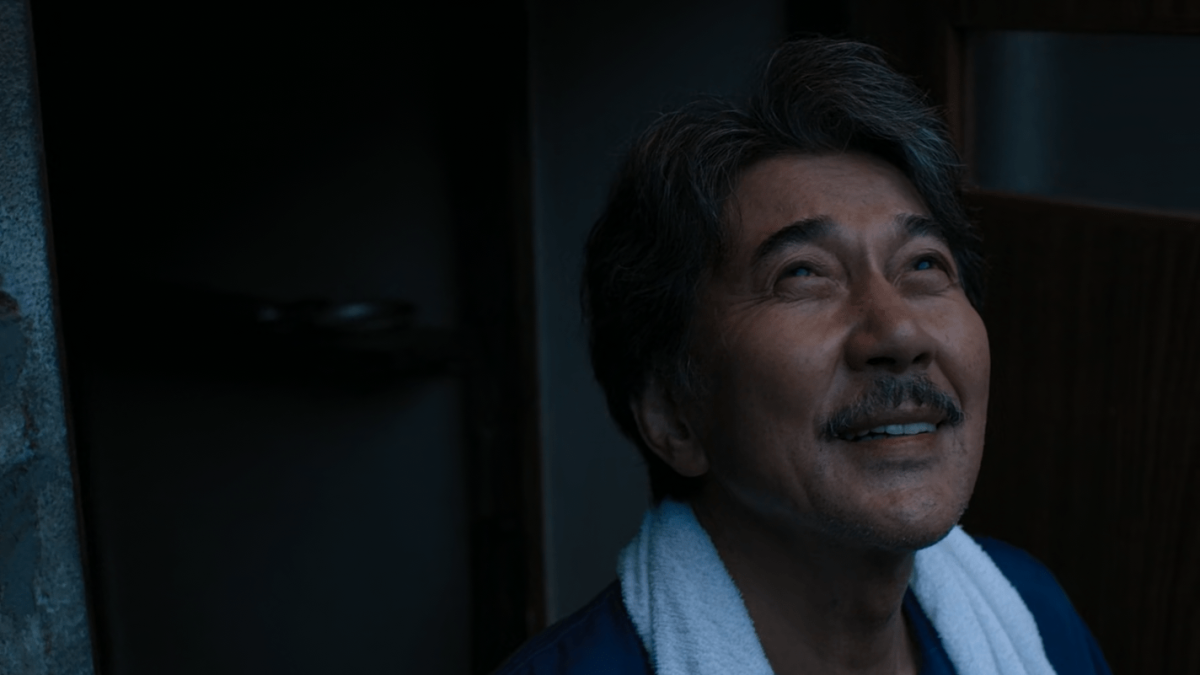Wim Wender’s Masterpiece – Perfect Days
Seeing life through the lens of practical optimism
What Is a Perfect Life?
The answer is very personal and subjective. Someone (rather most of us) wants to retire with huge corpus, someone wants true love, someone wants their dream job in that dream company, someone wants to travel the whole world, someone wants to follow their passion, someone wants to create something, someone wants the ultimate power/ strength, someone just wants happiness, someone wants knowledge of everything, someone just want their neighbor to turn down that noisy speaker, someone wants to spend time with their loved ones, someone just wants to be left alone, someone wants a fixed routine where there is predictability , someone wants surprises every day, someone just want to lay down in the bed for the whole day, someone wants to eat whatever they want (without gaining weight!), someone wants a healthy body, someone wants to remain young forever. Billions of people and their infinite definitions of perfect life!
In short, even though we have our associations of a perfect life with certain objects, things, qualities, people in life, the common thing about them is that we want them in the way we desire.
So, a perfect life for anyone is a life on their own terms, things would happen in the way they want.
Is your life perfect? I am sure that there are very few people (rather gods, saints, sages, divine people) who would agree that they have perfect life.
Wim Wender’s Perfect Days Movie
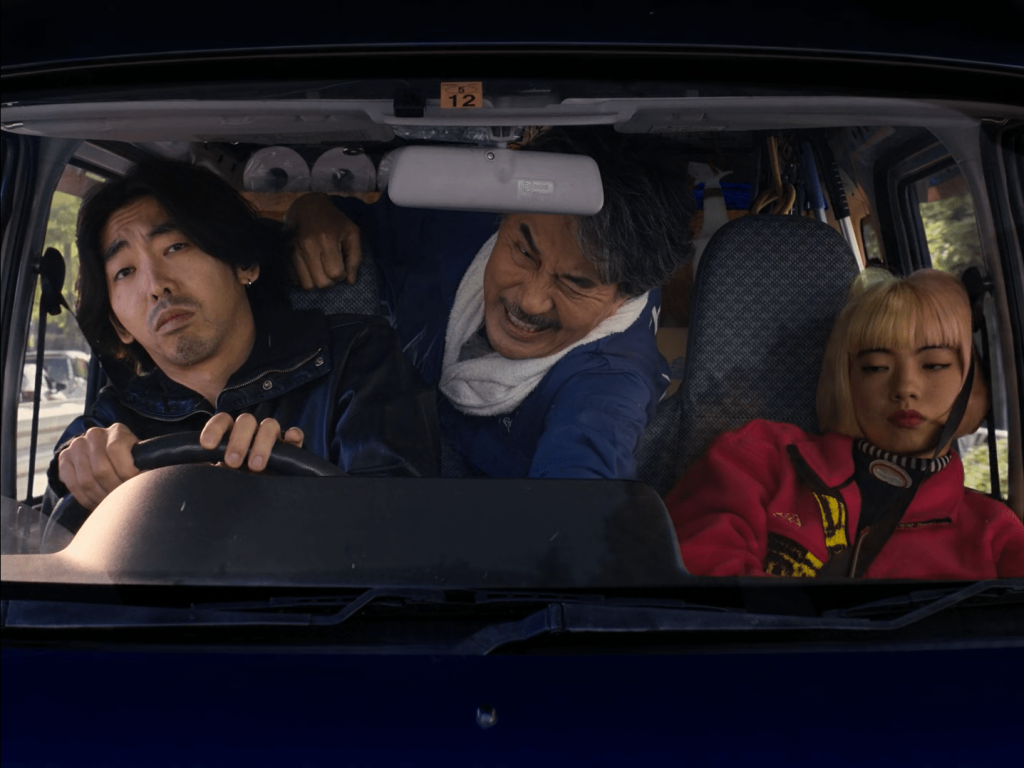
This Japanese masterpiece led by Kōji Yakusho as Hirayama-san is the perfect depiction of how we try to define our life as a perfect life in our own ways. The personalities, the characters, their choices, and the life they have is designed, intertwined in the narrative in such subtle ways that the whole movie could be discussed as a philosophy of life and the time will fall short. And even after that you would think that it is just a documentation of a normal life of a public toilet cleaner.
Even though the movie is multifaceted like life and can be discussed in greater depths, I will try to touch on the core and simple idea of the perfection in life in the forthcoming discussion.
The discussion will make more sense if you have watched the movie before, this is not a movie synopsis. Even though there will be spoilers ahead, the movie is all about how it made you feel, rather than what you knew about it. (Which is also why movies/ stories are so important, they make us feel that part in us which we never knew we had already)
The discussion will be driven by the major noticeable events in Hirayama-san’s life.
What We See From Surface? – A Life of Complete Failure
The (Mundane) Routine and the (most) Disgusting Job
Hirayama-san works as a public toilet cleaner in Tokyo. There is nothing else to describe anything exciting about this job! He travels from location to location to clean the toilets where you will see the interaction between Hirayama-san and the people around him in such ‘workplaces’ as belittling, demeaning. It’s a job that no one appreciates.
When we understand that Hirayama-san lives alone, you will find this routine more boring, mundane; being a toilet cleaner adds another weirdness to it. It’s a low paying, thankless job where you will never get recognized for the job you do.
There comes a moment when his junior, his subordinate – Takashi resigns from his job without giving any notice and Hirayama-san has to cover all his locations that day. It’s a disgusting low paying job with possible non-rewarding overwork.
Low on Money
Money-wise Hirayama-san looks like a person with below average necessities and below average job to fulfill them. Even though he is not poor, he is not hopelessly broke; it is just a very basic life lived on basic income. But you will see that his life is just on the edge of poverty the day when he pays his junior – Takashi to go on a date with his love interest – Aya-chan. As Hirayama-san pays Takashi all the amount he has and when his car stops in the middle of the road due to low gas, he has to sell his cassette to get some money to reach home. On the same evening he eats the cup noodles as he has no money. He stays in the low lying, cheap house, the only coffee he drinks is the regular vending machine coffee.
Failed Relationships
Hirayama-san is a loner. There is nothing exciting about his life from the relationships point of view. No wife, no children, no one to take care of him if something goes wrong. There is a moment when we realize that his father suffering from dementia is in nursing home and he never pays him a visit. Hirayama-san also doesn’t go well with his sister – Kieko. There is certain disagreement (probably the toilet cleaning job) between him and his sister which is why his niece – Niko is prohibited to meet him.
There comes a moment when Hirayama-san sees his (supposedly) love interest – the owner of the restaurant – Mama hugging some man affectionately. Hirayama-san is not shown openly in love with Mama but the interactions between them show that they have some deep connection, deep affection for each other. Hirayama-san’s heart gets broken when he sees that there is already a man in her life. Heartbroken Hirayama-san buys beer and cigarettes that day to numb that pain.
If you go by the standard definition of a perfect life – Hirayama-san’s life is not perfect. It is not even a good life per say.
What is the Reality? – A Life filled with Richness in Every Experience
The Discipline and The Dedication
You will notice that Hirayama-san is a very diligent and disciplined person who cleans the public toilets in Tokyo. Even though he is a toilet cleaner he has a discipline and routine like an army general. Whatever may happen he always sticks to his routine, even on holidays. His van is equipped with every possible cleaning equipment to make sure that he does his job with perfection. There is same level of dedication for every cleaning job he does. He is never ashamed of the job he is doing.
You will appreciate this more when Takashi asks him that even if the toilet is getting cleaned now it will eventually get dirty. You must note that this is the same discipline why Takashi respects Hirayama-san and considers him dependable (although Takashi himself is reluctant to remain in that job)
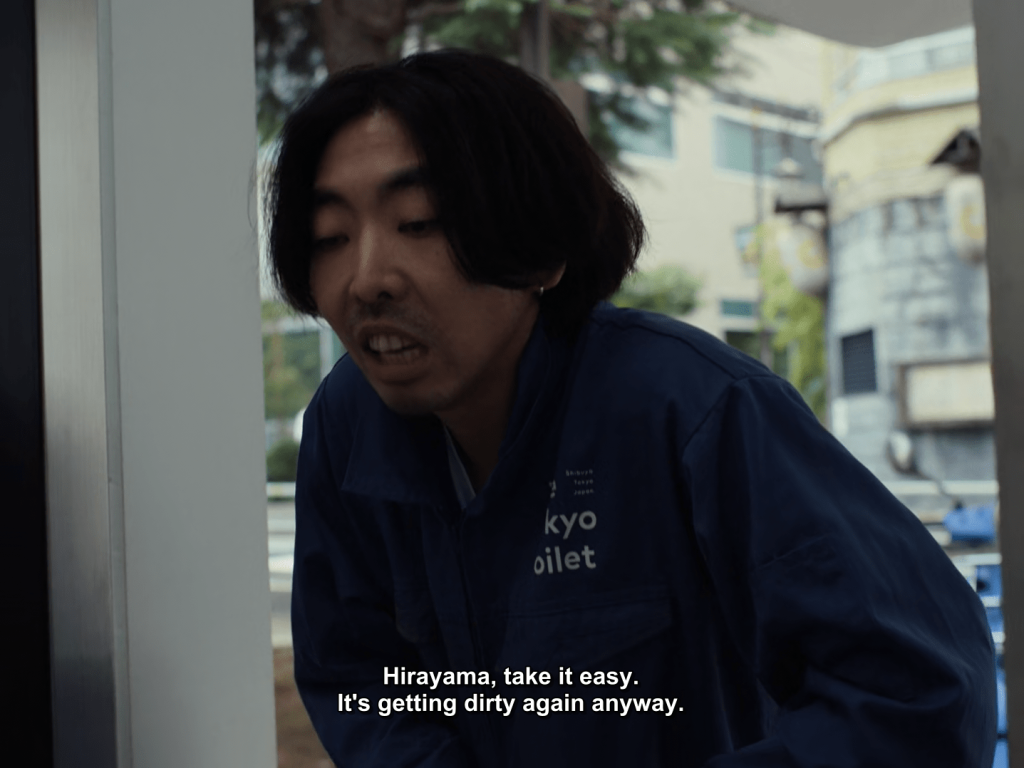
But, imagine if no one cleans the toilet regularly, how dirty will it get. Same is about life. Pardon my analogy of toilet with life but even though seemingly full of randomness our life needs a routine diligence, a routine discipline to take care of our overall health – mental, physical and/or materialistic. These seemingly small, insignificant routines decide our habits and these habits eventually decide who we are – especially when the times are difficult. Our responses to random, unplanned, unfavorable events in life are completely dependent on the how we react to routines. Our habits are the baselines to decide the reaction to unfavorable events.
You must appreciate that even when there are many sad moments in Hirayama-san’s life he always sticks to his routine. This ‘boring’ routine ensures the mental peace that even though many things in life are going wrong there are certain things which have gone perfectly in the given day.
You know what they say, “If you want to change the world, start by making your bed.”
That is why routine is very important psychologically, it is like a subconscious support system to tell our brain that at least some things are going well.
The Hobbies
Even when Hirayama-san is continuously busy in his toilet cleaning job, he is always in sync with his surroundings. He has that eye of a professional photographer where he is always trying to capture a perfect moment of light and shadows and reflections around him. His job is not preventing him from pursuing his passion.
What this shows is that one must have access to certain intangible experiences which are present all around us to have a healthy living.
So, an ideal hobby is the activity which is accessible to us in any form to elevate our perspective about the world we live in. If listening to music is your hobby, even when you lose your music player, or you have to lose your cassettes (like when Hirayama-sells his cassette for gas) the music in you cannot be sold, you can still reminisce that tune and hum to it.
Even when you have the cheap, outdated camera you can still appreciate the picturesque beauty of nature and the interplay of things in it with your eyes and creativity.
Hirayama-san’s cassette collection is not an outdated relic, rather it is shown as a valuable classic item. It is wonderful because our hobbies provide this unfair advantage through their intangible nature to outweigh the tangible, materialistic possession. (it’s like as seemingly nonsensical painting made from paints and canvas worth some hundred bucks becomes invaluable because how it touches that intangible aspect of your life.)
Hobbies thus are a powerful tool to bring real wealth in life – this wealth can also create materialistic advantages if used in proper ways. (Some people turn their passions into a career)
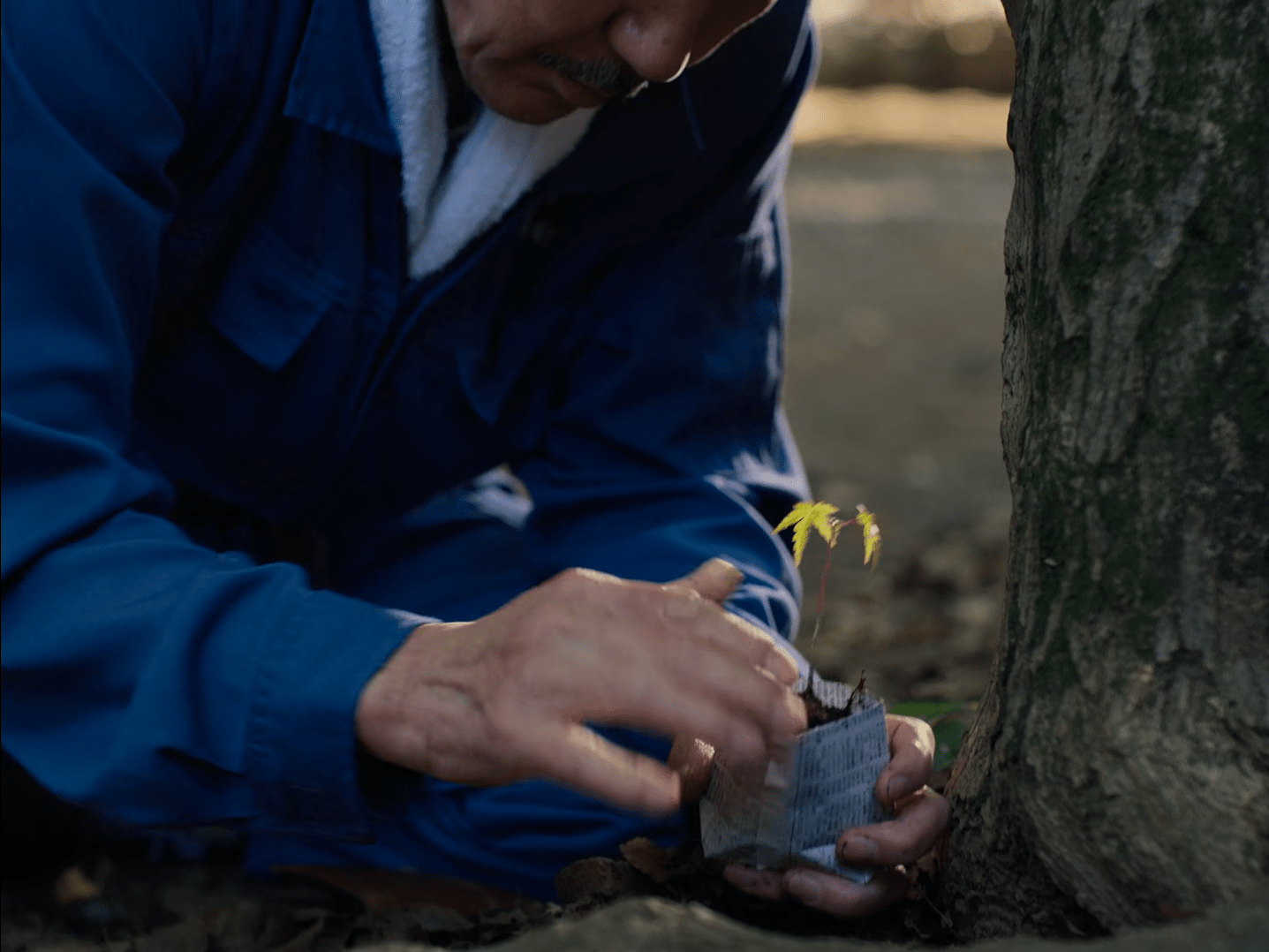
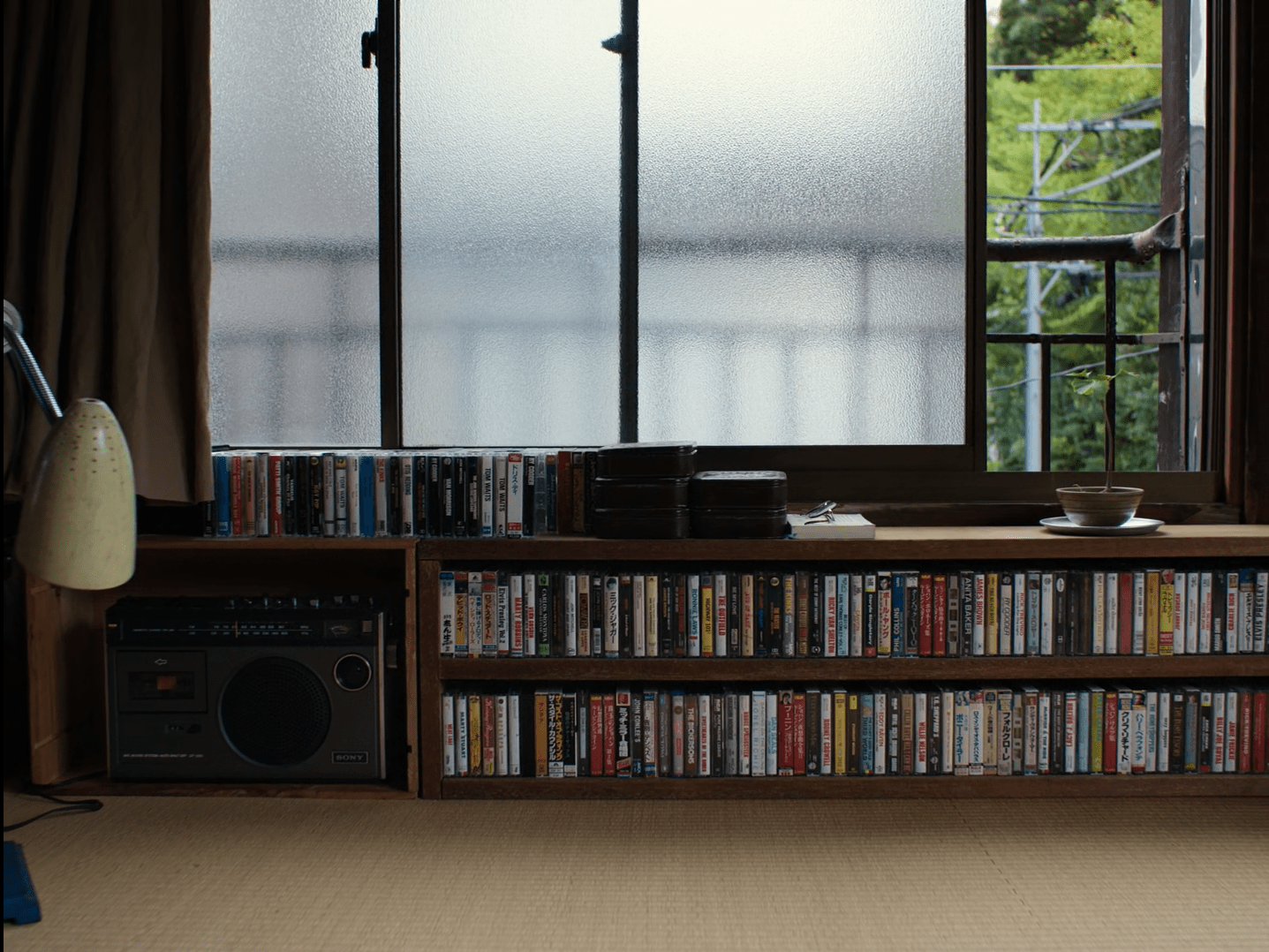
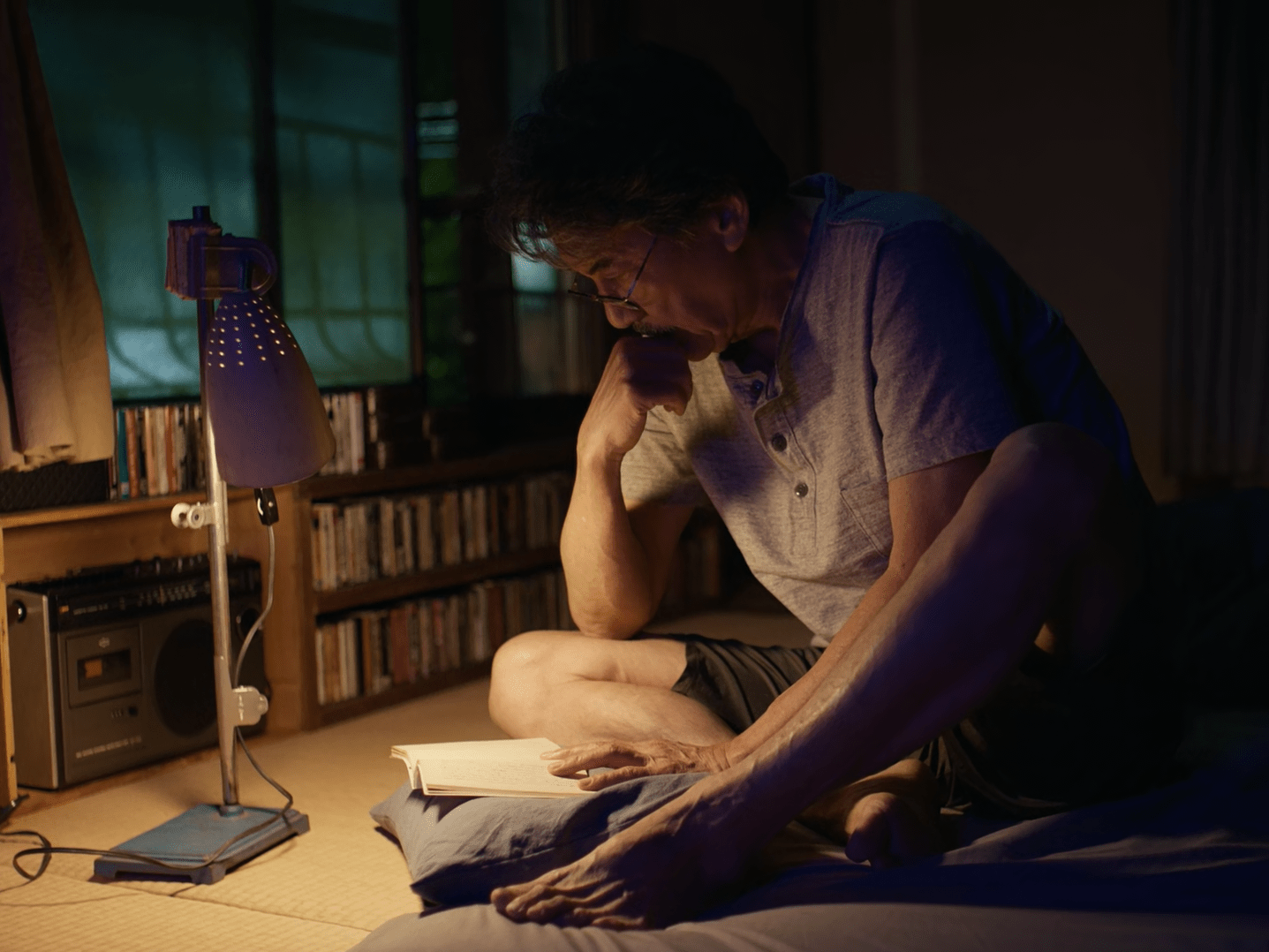

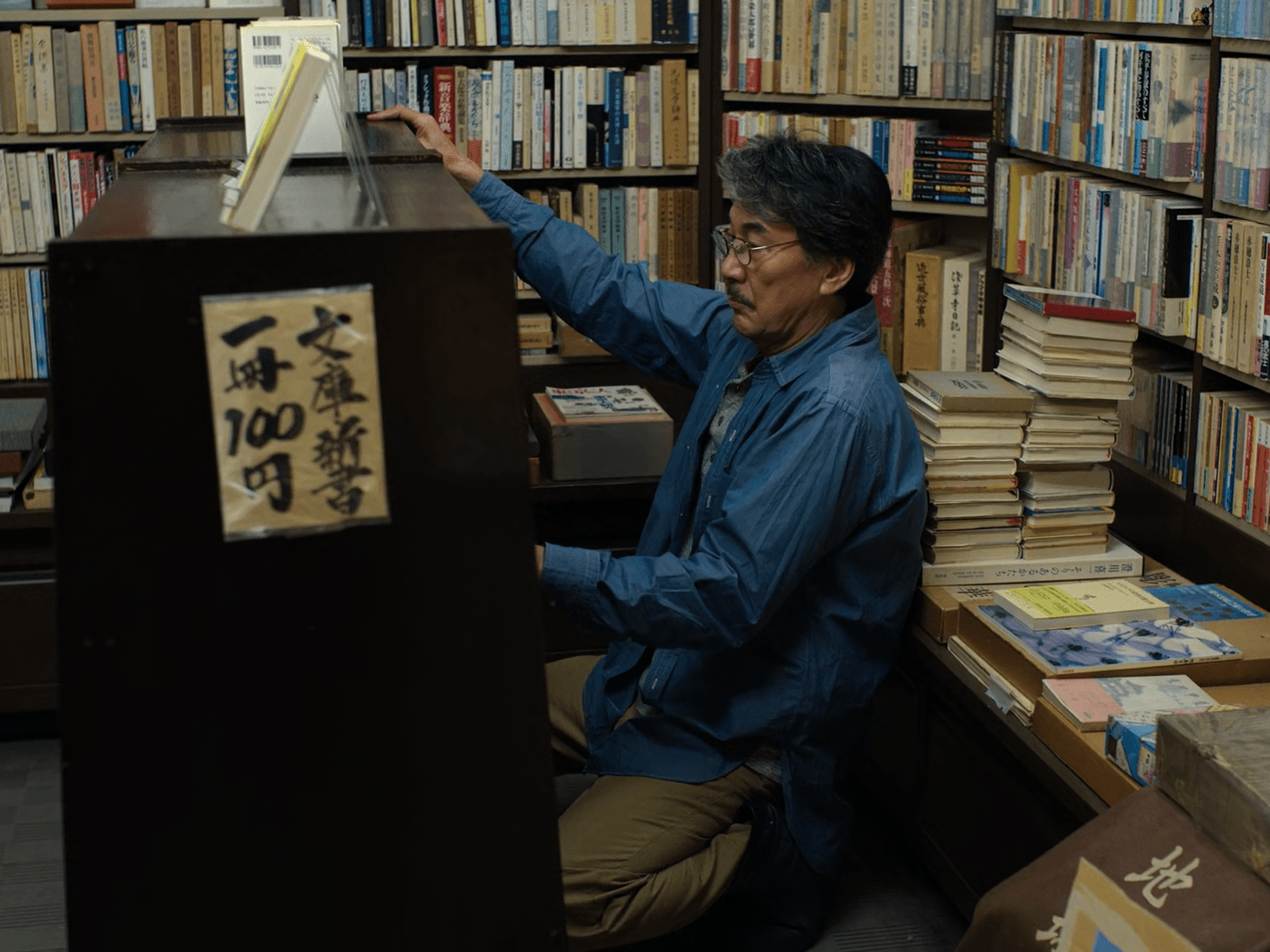
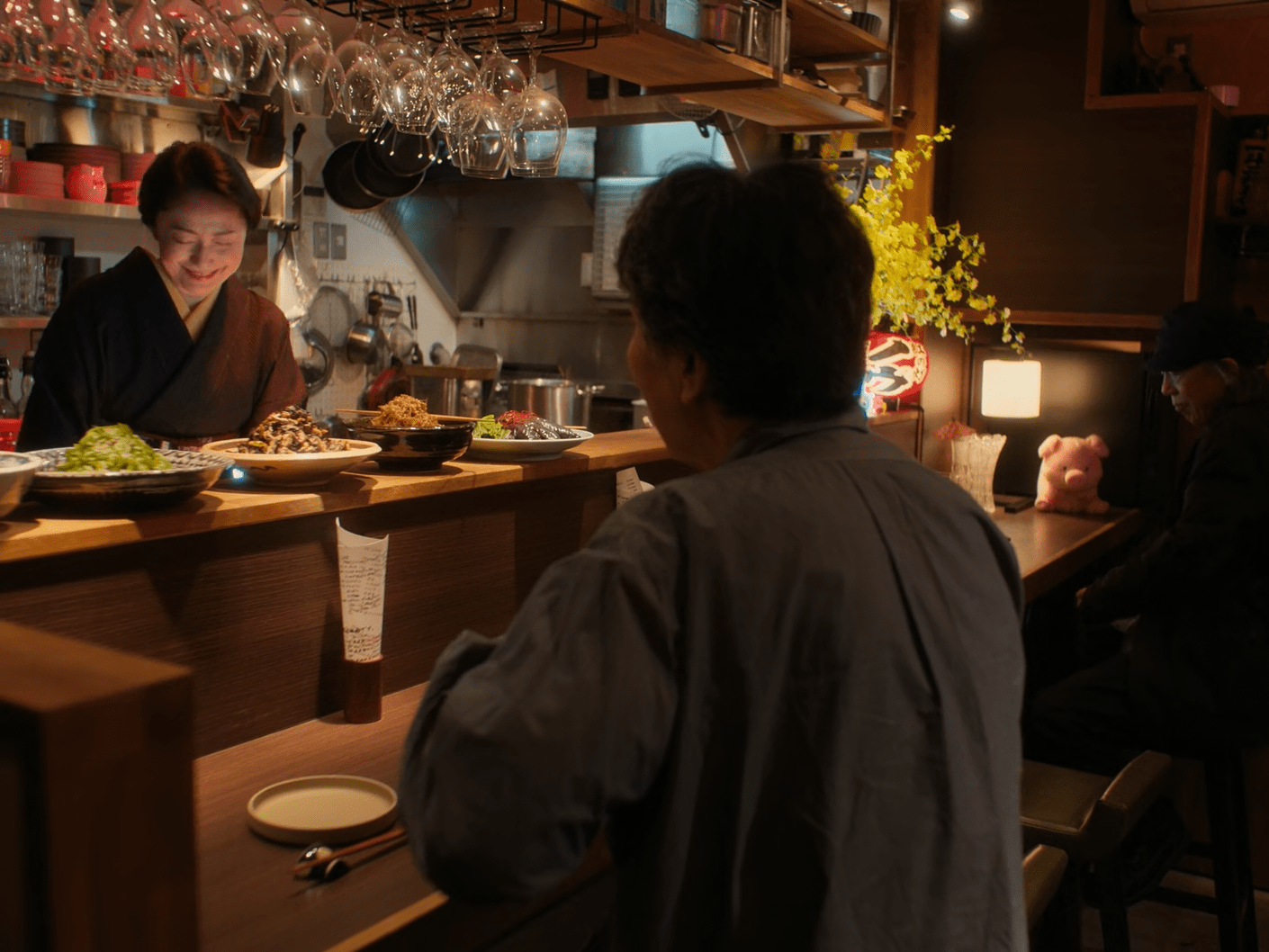
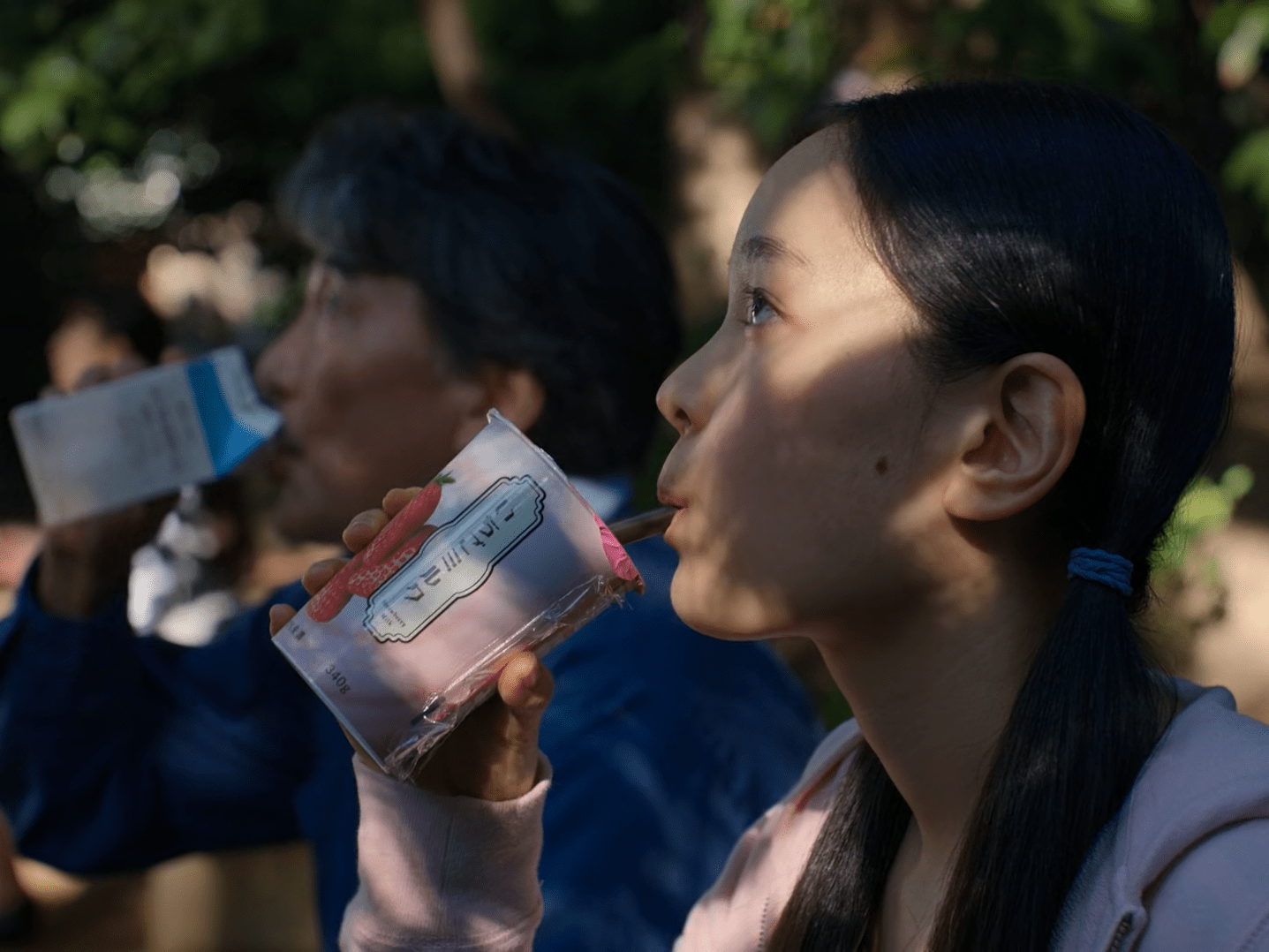
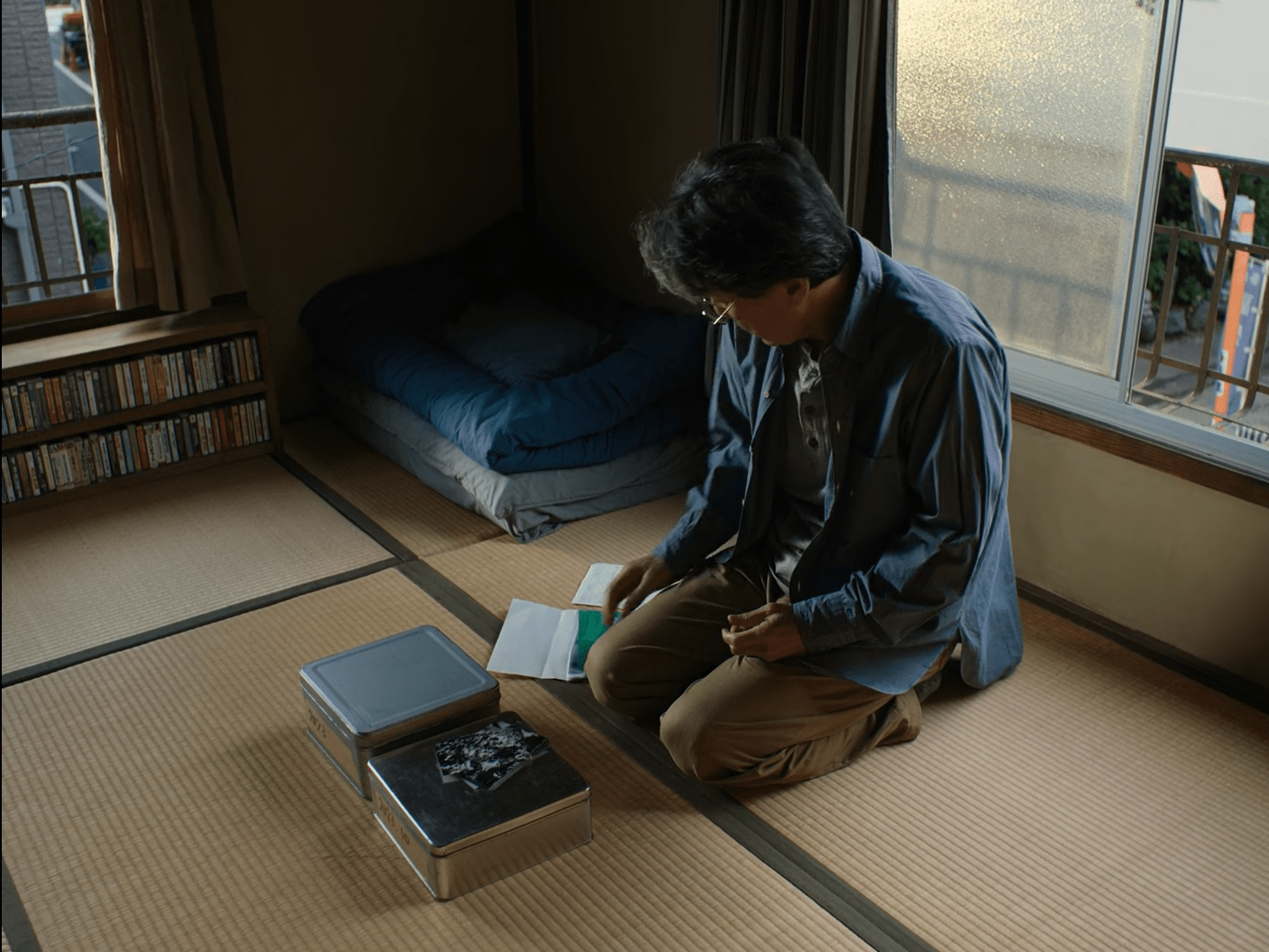
Please note that hobbies are not always meant to bring in some materialistic benefit. In Hirayama-san’s case collecting saplings, watering plants is just for his mental satisfaction, it also shows his caring – nurturing side. Some hobbies, most hobbies are meant to carve out your best version. This best version can take care of everything materialistic and non-materialistic.
Hobbies also help you to create a deep meaningful relationship with the people from different walks of life. You will see young Aya-chan’s appreciation for Hirayama-san on his taste in music. His niece truly values her uncle for making her aware about photography, reading and music, the restaurant owner Mama appreciates his intelligence for his reading habit.
Hobbies provide an access to the pleasures – priceless pleasures which are difficult to trade with anything that is materialistic in nature. Habits make you passionate about something, anything. We are human beings because we are passionate.
Routines bring in that predictability, certainty and thereby comfort in difficult times whereas hobbies ensure that we are always open to appreciate the beauty in novelty, randomness when our routines become mundane.

Meaningful Connections – Loneliness vs Solitude
A relationship can be predetermined or could be in our hand. And both are equally important in life.
Even though Hirayama-san does not go well with his sister he knows that their worlds are totally different. It does not become a reason to envy his sister. (His sister is shown having a car with Chauffeur) He also teaches his niece about the closeness of relationships despite having differences very well.
Hirayama-san is depicted as lonely person but there are many relationships which are an integral part of his life. The restaurant owner – Mama who is always appreciating him for his intellectual ways despite knowing that he is a toilet cleaner, his deep connection with his niece who hasn’t met him for many years (he almost finds it difficult to recognize her when they first meet)
You must appreciate that despite being a complete introvert, a lonesome person – Hirayama is very effective in establishing immediate and intimate connections with unknown people. Being an introvert does not mean that the person is shy, it just means that they are highly selective and they mean it when they do or say it. (hence, this is one of the most consistent depiction of introverts in movies.)
You will see Hirayama-san immediately comforting the lost boy in garden (even though the boy’s mom treats him badly indirectly), playing tic-tac-toe with some unknown person, recognizing the homeless person whenever he appears, having good relations with the caretaker of the garden where his has his routine work time lunch, the bookshop lady appreciating him for his taste while selecting the books, he is also able to bring calmness to the cancer diagnosed Tomoyama – the ex-husband of Mama – the restaurant lady.
This shows that you can remain as a single existent person and still you won’t miss life. You will not miss life because you are at peace with who you are and what you want to do with your life, otherwise this same single existent person is engulfed into loneliness.
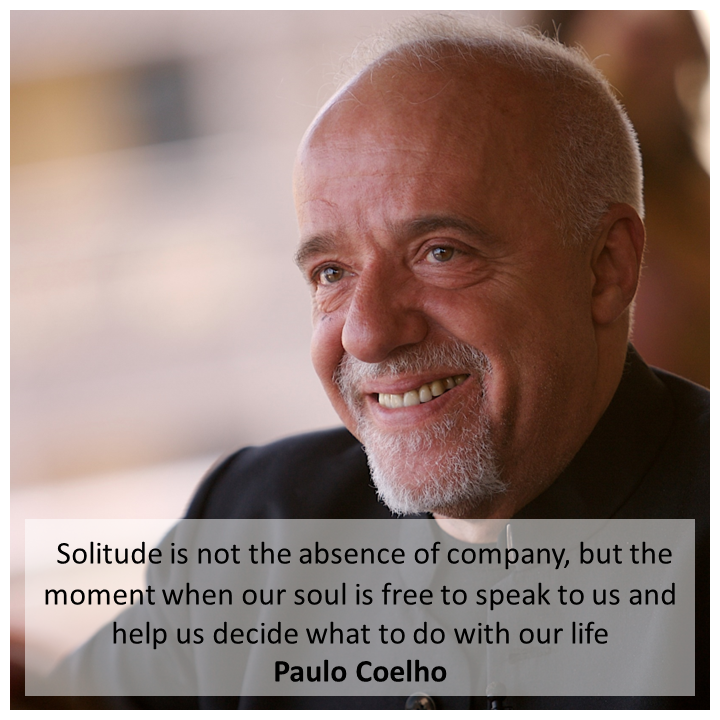
Hints of Stoicism
There are many instances in the character of Hirayama-san where you will find the principles of stoicism. Stoicism appreciates the order of nature and not resisting that order. One must be flexible to appreciate the ebb and the flow of the life which is the core of stoicism. If it is in the nature of the given thing, it will eventually happen, how you respond to such things is the only thing in your control.
Conclusion
As the life is multifaceted so is the interpretation of the movie perfect days, but I will try to highlight certain important takeaways.
A River will eventually end into the vast sea, but that doesn’t stop it from flowing
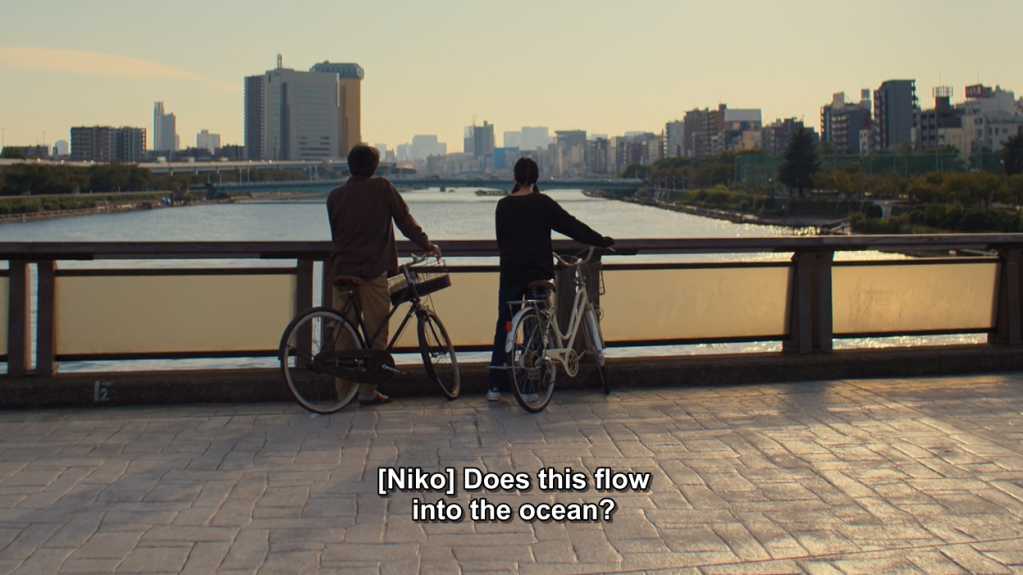
When Hirayama-san is talking to Niko about the difference in his and his sister’s world, he gives Niko a life lesson. This simple message has become the popular highlight of the movies all over.
Next time is next time. Now is now.
But this statement comes from the following discussion where Niko is trying to find her place in the world of her uncle and her mother.
The world is made up of many worlds. Some are connected some are not.
And the analogy of river and the sea/ocean is used to justify this scene.
So, even though our lives, our worlds are sometimes connected and sometimes not they are eventually meant to end into the vastness of the overall one existence thereby losing their own identity. But that should also not bring in the fear for the end of our distinct existence. Because even when the destiny of the river is to meet the ocean in the end that does not stop it from flowing.
That is exactly why Hirayama-san tells Niko that you will eventually find the world where you belong and maybe you will have you own isolated world but that should not remain your concern, your concern should be – “are you living in the current moment?” that is where you belong.
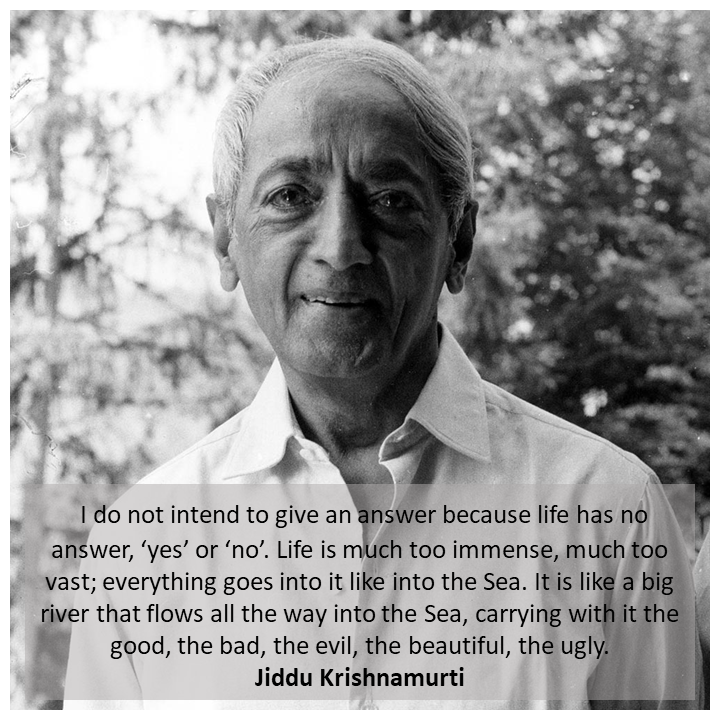
If you keep on justifying your life based on how and where it started from and how and where it will end you will miss many precious things, unnoticed and underrated things, moments, people in current reality which would have made your life actually beautiful.
Instead of fearing for the end in the future, let us first appreciate the current moment.
One Suffering is equal to many sufferings and many sufferings combined is one suffering
The discussions that happened between the ex-husband of Mama called Tomoyama and Hirayama-san is the most unnoticed message of the movie I would say. Actually, the movie is filled with so many messages that this is normal.
Tomoyama tells Hirayama that he regrets that the terminal cancer he has will prohibit him to live the life to the fullest. There were so many things Tomoyama wanted to know but won’t be able to know only because of this cancer. He also feels sorry that he left Mama and come to realize her worth only when he is diagnosed with terminal cancer. It’s like only when the life is getting snatched away from us is then we start appreciating life of others especially the people we loved.
The doubt Tomoyama presents to Hirayama hence is very symbolic here.
Tomoyama - Shadows...
Do they get darker when they overlap?
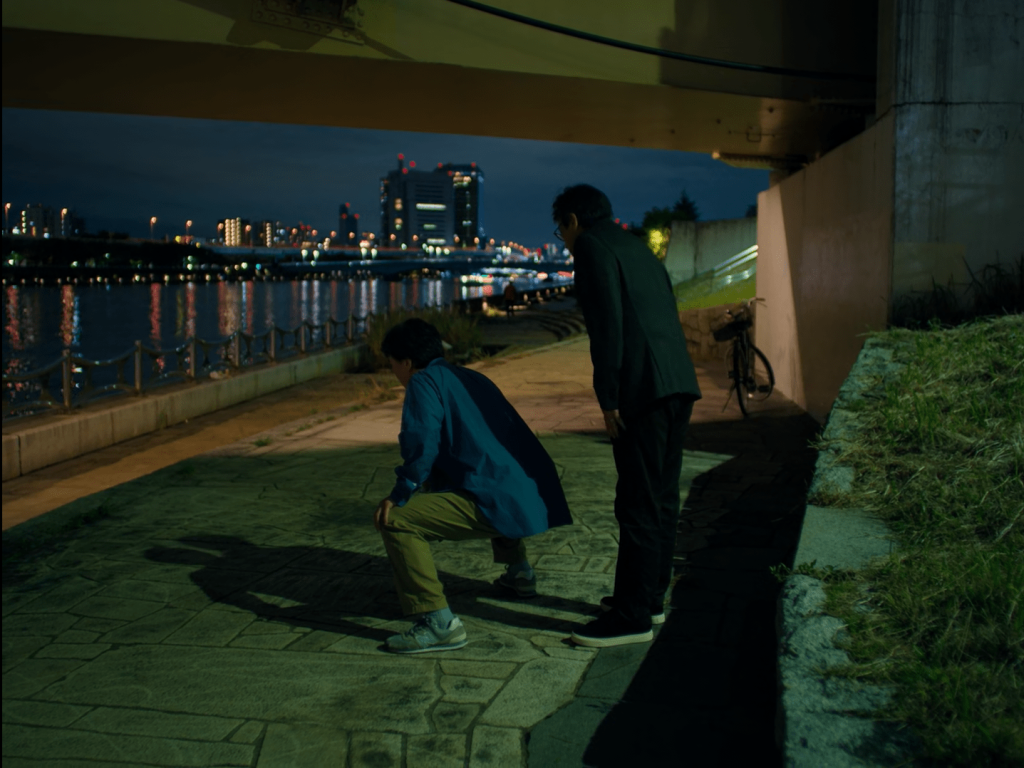
I think the gist of whole narrative of the movie lies in this moment, where they both find out that even when the shadows overlap the darkness remains the same!
Do you see what is happening here? It is like ‘even the darkest clouds have silver lining’ – type message that is portrayed here.
The shadows represent the suffering in our life.
You will feel sad when you have a problem in your life, you will be sad on the same level when you are having multiple sufferings/ problems. I have a proof for this.
You cry on one problem as the biggest problem of your life and then you see another person having practically bigger problem than yours which pushes you to think that yours was nothing given to the suffering that person has right now. It is all about how we define abundance, how we define satisfaction where the life itself is infinitely abundant like the light. Any single shadow of suffering or many shadows of suffering will create same darkness when they overlap but the light of life is far brighter than that.
And where there is light of life there will be shadows of suffering.
So, this works both ways,
When you have one suffering it will affect only this current moment. If you remain in this moment, you can certainly work over it.
And when there are many sufferings combined together, they too can affect only this current moment. If you act on the current moment then only can you pass to the next one. It’s one moment at a time. That’s how you live. There will always be many problems, shadows while we live but to live is the highest privilege, the light of our existence.
This is why the movie ends with the term:
KOMOREBI – the shimmering of light and shadows that is created by the leaves swaying in the wind. It only exists once, at that moment.
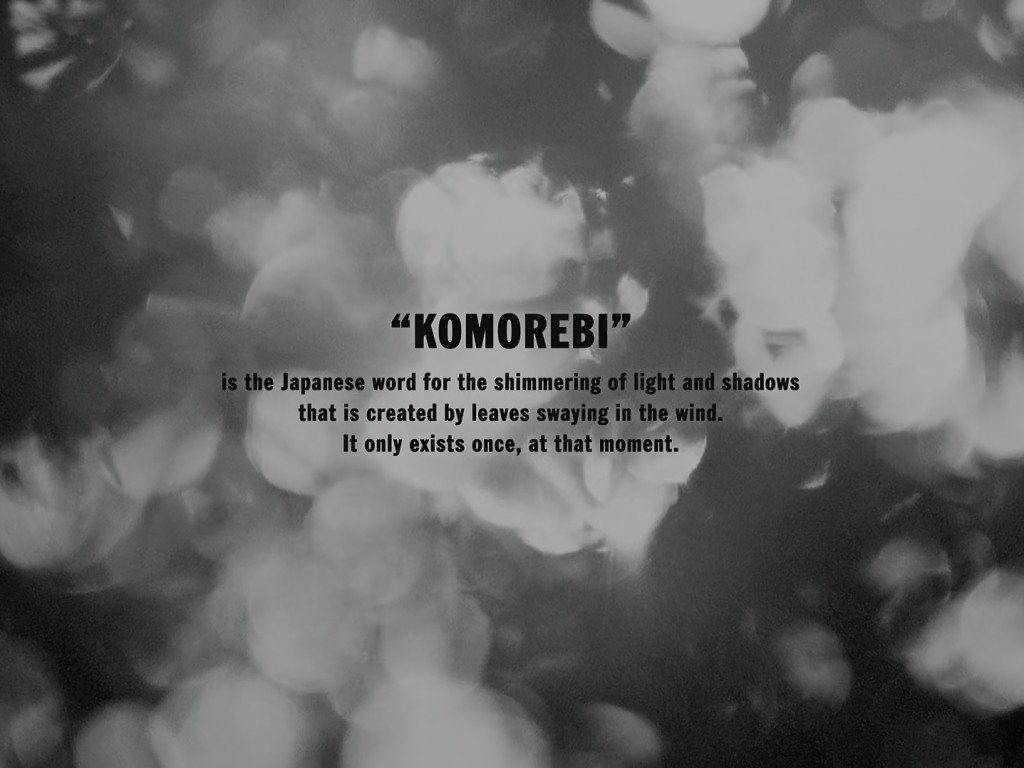
Whatever big problem/suffering, whatever big victory/ happiness/ fulfillment/ satisfaction there is, they both exist only in that moment. You just have to pass through them all the time and appreciate the life granted to you.
This too shall pass.
Nobody can steal from you how you experience life
When we say that many sufferings and one suffering actually impact our lives similarly, we are allowing infinite possibilities, infinite perspectives to take action which are far more positive than these tiny, petty problems.
The problems seem big than the infinite possibilities because we try to limit our lives to remain in our defined ways, our own set standards which we create by comparing ours with the lives of others.
We try to fit the aspects of life on some measuring scales defined by this materialistic society where many beautiful dimensions of life are lost forever.
That is why you must try to create the places, moments, people, habits of your own choices which are not soiled, stained by the comparisons with other lives. Try to connect you moments with something intangible using your hobbies, routines, relationships. You will lose things associated with them but you will never lose how they made you feel. You can share that, amplify that with others but nobody can steal it from you, because you were the originator of that experience.
Any type of Life and the consciousness of it being granted to us is a privilege
We are always trying to justify our pain as the bigger pain than others and glorify our own best experiences over the experiences of the others but we keep on forgetting that it is the same life flowing through all of us.
A perfect life is a life of appreciation for the privilege of getting a passage through life and its awareness instead of valuing the materialistic privileges like money, fame, career, relationships, lifestyles, possessions.
The life is a spectrum not a side.
We will always have many reasons to cry about our lives over other people’s seemingly better lives but believe me only one reason is enough to justify the grandeur of the life that is granted to you and through you. The so-called imperfections assigned by us to our own life look really petty in front of the infinite possibilities that the same life has to offer.
That is exactly why, appreciation of what good life has offered and the courage to deal with what bad there is in the life is important. Appreciating the imperfections of life is the perfect life. You live it through moments one by one thereby creating your perfect days.
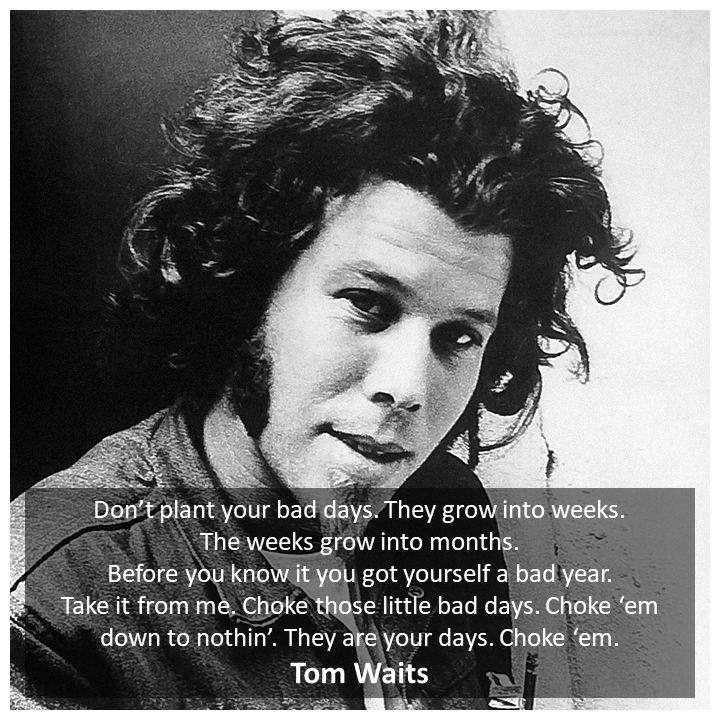
Cover image from Wim Wenders’ Perfect Days

